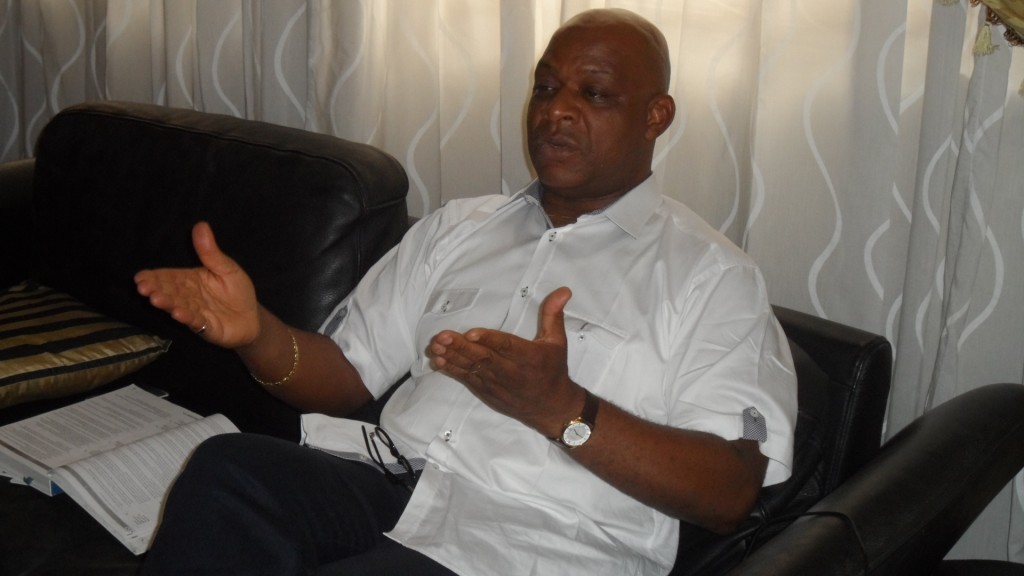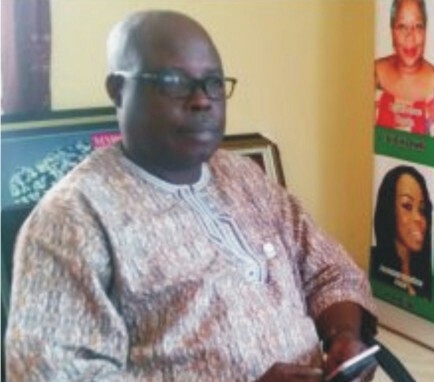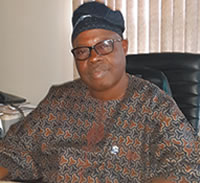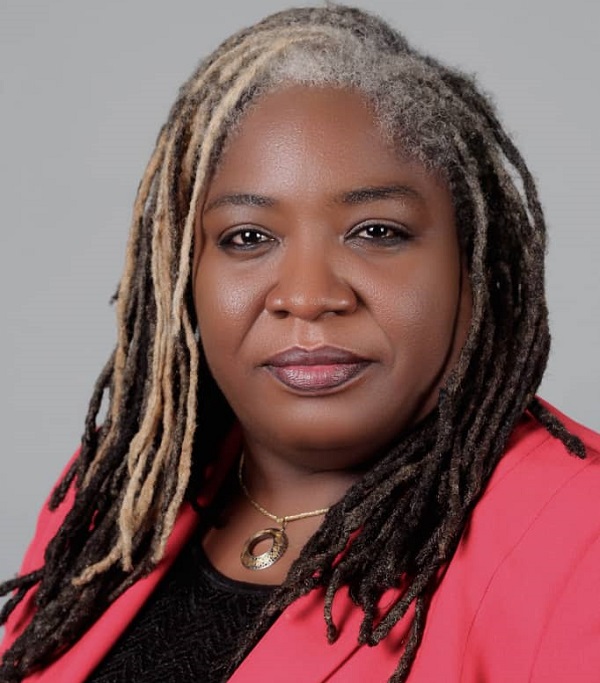My Winning Edge- -Omatseye

Barr. Temi Omatseye is a former Director-General of the Nigerian Maritime Administration and Safety Agency (NIMASA) and the Nigeria Ship-owners Association (NISA) presidential aspirant. He was born fifty years ago in Warri, Delta state. He was educated in Nigeria and Britain. He obtained his first Degree in Politics and Law from the University of Wales, Aberystwyth. He was called to the Nigerian Bar in May, 1989. Omatseye obtained a Masters of Law degree in London school specializing in Maritime Law. He inherited a shipping business from his father and set up Polmaz Limited, an oil and gas servicing company and exporter of rubber. In 1993 with fifty thousand and a dream, currently has a turnover of one billion naira. He was appointed DG/chief Executive Officer of NIMASA on July 8, 2009 and served in that capacity till November 10, 2010. He is a man very passionate about the maritime industry, he has been involved in several struggles including the implementation of the Cabotage Act, Cabotage Vessel Financing Fund, lopsidedness in contract approval to the detriment of local shipping operators to mention but a few, all for altruistic motive. He is married with three children; he is a keen golfer and also enjoys reading and travelling.
In this interview with MMS Plus Weekly, he explains why he wants to enforce the Cabotage regulations. How did he help to grow NISA as NIMASA DG? Omatseye has answers to all and many more questions.
Why do you want to be president of NISA?
I have been a participant with ISAN as it then was years ago before I became DG of NIMASA. As a matter of fact, it is verifiable that I, Labinjo, Jolapomo and Capt. Iheanacho were in the forefront at the time when we wanted to pass the Cabotage Act; when there were very powerful interests who did not want the Cabotage Act to be passed. They wanted it stopped and we were part of the task force that was involved then. Even before I became DG of NIMASA, I also was involved in the local content committee which had Ernest Nwapa as GM Local Content, then Mfon was then the DG of NIMASA, we had this committee, which led to the Local Content audit, which led to auditing a lot of shipping companies then. So, I have seen it from the administrative, that is from maritime administration and I have been a ship owner that is, the private sector. I have always said that one day; I will definitely come to my sector. I believe that with my level of experience and exposure be it in aspect of financing, ship operation, ship management, commercial and also the way in which government thinking is and also I have the legal background to understand clearly how laws have been put together and we can come together as an organization to make it better for Nigerian ship-owners.
When you were DG of NIMASA, how much role did you play to help NISA grow?
You cannot wear the hat of being a NISA member and then a regulator. We at maritime administration basically are independent arbiters, but you must also appreciate that as a maritime administrator, your job clearly is to ensure the implementation of all International Conventions as for which Nigeria is a signatory to for which Nigeria also has domiciled. You cannot wake up one day and say because I am member of NISA, I must work with NISA. I was a staff of the Federal Government of Nigeria, therefore whatever International Convection the country has signed or has gone into which has been domiciled with me, must be implemented to the fullest. Therefore, if for instance, there is a requirement that all vessels must be double-hauled, I will not say because I have NISA as a sentiment, I will not implement those kinds of issues. So I was very focused on the issue of safety and environment as relating to International Conventions but on the other side of things, we were pushing hard to ensure the passage of cabotage.
For instance, I always have a feel that which I always say at fora that the Cabotage Act is good, I have problem with the Act as it is implemented, the challenge I have has always been with the CVFF but at that time I was able to get PLIs approved, so whatever they are doing now even the names of the people that were done was actually gone through at my stage all they were just doing was tidying up the work as it is done. Many of those things were done during my administration for the maritime industry. So, when it comes to ISAN I have always been a shipping person first of all, but as a maritime administrator, you must divorce yourself from the issues or sentiments expressed by the ship owners with the issues or ground that relate to maritime convention, I have always told ISAN people that they should not see me as an outsider because the day I leave this job, I am coming back to my sector because I have always being in that sector and there is no other place I can go. All I have running through my blood veins is maritime.
We had then a strong maritime administration which is what we are trying to build, that was what led to the restructuring of the agency, and putting job description in line, professionalizing the whole agency was good for the Nigerian ship owners. That is the challenge we had with NIMASA, when you are dealing with people who came from the old NMA and they don’t understand anything about shipping or shipping operations. So what happens is that, when a ship owner discusses with a maritime administrator, they are on two different frequencies so what we are trying to do also was to make a strong maritime administration, so you might not see it as a ship owner but it is a process and if that process is completed, then Nigeria ship owners will not even need to walk in, like we are trying to do the automatic registry which means a Nigerian ship owner can register ins vessel sitting in ins office, he does not need to do that. We are trying to get ship identity system(SID) working why so that we move into getting seafarers their ship farers passport ,we are working on maritime labor, ensuring that proper wages are paid to maritime workers and ship farmers are getting their right wages. We were working on getting the certificates of all sea farers. Those are things that we are doing that if on the long run is completed will be of great benefits to the Nigerian ship owners. So you have to look at it from two perspectives but unfortunately we were not able to complete but we are working in that direction.
Will your becoming the president of NISA complements the efforts of NIMASA?
Naturally, because I have been there at the highest level of NIMASA, so nobody can wake up and say just anything. I sat on that seat, so I know exactly what is required. When it comes to issue of cabotage or organization, as a matter of fact I tell them what to do or where to go, I can tell them what to look for or what documentation to look for and how to proceed .
What other things are you bringing to table?
We have the issue of cabotage; it is a failure right now talking about the full enforcement of Cabotage. I think I have the better understanding of what needs to be done. If you look, the company that is sponsoring me took NNPC to court, because we have identified clearly a certain aspect of the law that will actually make Cabotage Act enforcement. The judge interpreted it that if you don’t have the part, you cannot perform in Nigeria waters, we wanted to go a step further but fortunately NIMASA has taken it up now, they are going to enforce based on that specific aspect of the law that went to court. Even without NISA election coming up, I had started to do what I needed to do. As I speak to you today, I am a persona-non-grata in NNPC, nobody wants to see me. As a matter of fact, my vessel was offered two or three times to NNPC, but they rejected it, they said we took them to court.
I have made my own sacrifice, so I am suffering, I cannot get any contract from NNPC, I cannot even go there anymore because I am now a persona-non-grata, because I took them to court and identifying clearly that they are breaking the law. In addition to that, we talked about the issue of crude carrying and I have told everybody clearly that it is not an issue of sentiments, don’t go begging to NNPC .On the issue of crude being carried by Nigerian ship owners, the unfortunate practice has been that many people have been going cap-in-hand begging to NNPC for crude lifting and we don’t need to do that. A lot of people do not know this but I know. I will read to you the section 35 of the NIMASA Act states clearly that “The Minister on the recommendation of the agency may grant National carrier status to shipping company if Nigerian individual fully own a registered office, the vessel owned by a company that operates on international routes, deep sea and not just coastal waters with head office in Nigeria, owned at least one ocean going vessel not less than 5000 MT. The terms and conditions of employment of seafarers are met and the company’s vessels are registered in Nigerian ship registration office and the vessels shall certify all stipulated laws of the NSA and 100% or at least 75% of crew onboard ship including Captains, Chief Officers and Engineers are Nigerians”.
That is what the law says to form a National Carrier, but the law also said something further; if you read Section 36, it says” National Carrier shall have exclusive right to carriage of export and import cargo belonging to the Federal, State, Local governments, including Federal and State-owned companies and agencies. It goes on to say that the” agency and the Federal Government shall issue guidelines from time to time on incentives granted to Nigerian Ships other than the parties under section 2 and that the agency may from time to time develop and attach this. It also talked about carriage of dry cargo in section 7 .That I am a Nigerian, registered-ship owner does not give me the right to just carry NNPC cargo, I must be a National carrier. So, why don’t we meet up the issues of becoming a national carrier? National carrier is not for government, anybody can be a national carrier. Once we are able to meet up with the issue of National Carrier status as a company and it is not a political decision but a legal decision, so if anybody meets this requirement, NIMASA is bound by law to give the person national carrier status. If we meet this, the next thing that needs to be done is to take an order to compel NNPC, you don’t need to beg NNPC, just take them to court and tell the court that by virtue of you being a national carrier, the law says that you must at least give me 50%. The law says-subject to subsection 2 of this section, that National carriers should have the right to participate in the carriage of bulk, dry and liquid cargoes. The participation of National carrier in the carriage of bulk cargo to and fro Nigeria shall be subject to carriage right of not less than 50% of such cargo that is the law. So it means that 50% of all NNPC export and import must be carried. In addition to that, I will also make government see the light, that it is more advantageous especially when it comes to issue of crude theft, on how we as ship owners can help them.
If cargoes are sold on C and F bases what that means is that, you can declare; that means you are telling the refinery that you are bringing fifty thousand tonnes of products but we know what happens. A vessel comes in on an FOB basis, and supposed to load the 30, 000 barrels but loads 50, 000, and you know shipping, the master will do the details of the charterer. He can issue the first Bill of Lading based on 30, 000 which NNPC use to pay and issue another Bill of Lading for 20, 000, so if we domicile the lifting of products on the CNF base, what that does for us is that it often helps us to be able to curtail the amount of crude oil being stolen. We know quite well that the crude is being stolen at the Loading Position. These are the things we will enforce; we will also assist in bringing financing, we will join with International Ship Owners Association. We need to work with these people. We cannot be isolated as Nigerian Ship owners, we must work together. We will be able to approach these people with transparency and integrity.
These people understand they have made enough money from Nigeria. It is time for we Nigerians to begin to make that money, but we don’t want you to be excluded, because they own the vessels, they own the money, so we must have a kind of participation but this people are afraid to come to Nigeria to work because they don’t trust, so what I will do with my own international understanding is to bridge that and create a reputation and also make NISA an organization that has integrity, because we as the members should be able to hold on to our words and people will believe them and bring everybody together. And also on security, we are discussing with the Navy, so that we can begin to get alert of our vessels; we will engage the Navy and possibly Maritime Guard Command to support us. We are also working with the Trawlers Association; we will bring business partner s to walk with Nigerian Trawlers Association. So these are the things we are going to do. We don’t believe that Rome was built in a day; of course it is a gradual process. We already have the vision; all we need to do is to make government understand that their present policy is not in the interest of Nigerians. That working with us as ship owners is in the interest of Nigerians because we will create wealth, money and bring investments to this country.
What can you tell me about CVFF, there are insinuations that the money is missing- what is your take?
CVFF money cannot miss. It is very clear that CVFF account is totally separate, but I cannot speak for anybody but from my own point, CVFF account is separate from 3% accounts. When payment is made to the oil companies; ship owners pay into a designated account which is a CVFF account. And no one is allowed to draw on that money unless it is based on specifics, and that money is not a current account but a fixed deposit account. So the money is renewable every 30 days. So, I don’t know the issue of missing money but I know that money is paid in a specific NIMASA account number for CVFF. That is the situation. When we are going in for our budget, we have to declare to the National Assembly what the balance is at the particular time.
And if anyone decides to move the account what happens?
You can move the account from bank to bank but you can’t take out of it. That’s my own understanding.
What if the law is flouted?
I don’t know.
Nobody takes money from the rollover/interest?
The interest in injected back, it is a cumulative interest.
What if the President approves that money should be taken out of the account, can that be done?
It is not allowed by the law.
But we are talking about practicability, the law is one thing, realism is another thing?
If I were the DG, I will not take any money out of the CVFF.
When you were there, that’s what it was, what about now?
All I know is that, no one is allowed to take any money out of CVFF account unless it is to be disbursed to the ship owners.
When is the election date?
It is on the 15th of October and the manifesto date I heard has been shifted from 13th to 14th even though I have not confirmed that, and after that, all electioneering stops.
I think your friend is one of the electioneering committee?
He is not my friend, since he was inaugurated, we stopped talking.
How would you describe the Maritime Industry in Fifty Four years?
Snail pace is even better. Do you know what, this industry can turn around in just 24 months. But the administration has to be right, ship owners has to be ready, I think the policies I have which I already started running by the agency and the government are in line. If I am able to get there, I know the way money moves. I even discussed it yesterday, I was in a plane with one NIMASA staff, when I was coming from Abuja, and it was just a silly policy by CBN, whereby they said that you cannot apply for the letter of credit unless the vessels come from abroad. What that simply does is that, mother vessels that use to come to Lagos is now stopping at Lome. All STS operation is done by Lome mother vessels that go to Lome and pays a fee to the Togolese government. In addition to that, most of those cargoes are actually coming to Nigeria, so what we now do is send vessels as daughter vessels to the mother vessel to pick the cargoes and that costs money.
If that mother vessel has berthed in Nigeria, it would have been cheaper for daughter vessel to take cargoes from Lagos to Port Harcourt than from Lome to Port Harcourt as obtained today. Government is now losing money by sending daughter vessels to Lome to bring cargo to either Lagos or Port Harcourt. Mother vessel will pay, daughter vessel will pay, and cabotage will collect. That is the kind of money we are losing. If you go to Lome now you will see like over 100 vessels there, Lagos is about 143, so tell what kind of business is Lome doing that is having so much vessels anchoring there whereas it is not happening in Lagos. We need to go and sit down with CBN and explain that to them. Also, why is CBN giving sector funds to Aviation and not to Maritime? If a plane crashes, because of the CNN News, they will now give all airline operators something but if a ship sinks with crude oil or products the impact of that is 25-30 years. Look at what happened with Exxon or NNPC when their pipe leaks. So it is more in the interest of the government to fund the Maritime Industry even as it relates to safety.
Do you support the idea of having a new national carrier government owned?
I have always said that government is not in the business of doing business. Look at what happened to National Shipping Line. It collapsed because people who ran it did not understand what it means to run a shipping company. The same thing with National Unity Line, the same thing with Nigeria Airways. As far as I am concerned, I don’t believe in government doing business, whether you are government or not if you don’t follow the rules, you have no right to be given national carrier status. Leave it, leave the private sector to do it, give them National carrier status, they will go and raise an IPO in the stock exchange. Once you have cargo, you have cash flow, you get bank money. Government should not think that they are doing anybody favour. As far as I am concerned, I don’t need government to set up a National Carrier.
When Nigerian Airways stopped, is it not Arik that is doing the job now, and some other private airlines? The private sector can do the shipping business too, all we need is that there are laws that say that Nigerians should do this business, all we are asking Government to do is to stop patronising these foreigners and begin to patronize we Nigerians, and once you do that, you will see what will happen. Then we will now have the confidence to go to ship yards and buy ships and the moment ships start coming in, we will start to have ship yards that repair ships. You cannot g to a mechanic workshop unless you have a car, so it is when we are ready to buy vessels, Nigerian flag vessels that we require to dry-dock.
Then, every two or three year, ship owners and individuals can now invest in dockyard business they know that Nigerian vessel will be coming to dock their ships there. You cannot just wake up and tell somebody to build a ship yard; you need vessels that will be repaired in that ship yard. It is purely a business decision. So PPP or no PPP, government should just leave it, the private sector can do it. All we need is to just call in some big ship owners and say instead of me doing it by myself, look at this company that has one ship, and the other one, and the other one, let’s us come together, bring all our ships under one umbrella, let’s go to stock exchange, let’s borrow money and make this a big company. That was what we had before but what the government should do is what the law says it should do. Take for example, the crude swap, why should government be using foreign flag vessels for crude swap? Use that to carry crude out and bring petroleum products. Why can’t they even think of building up Nigerian Ship-owners?







